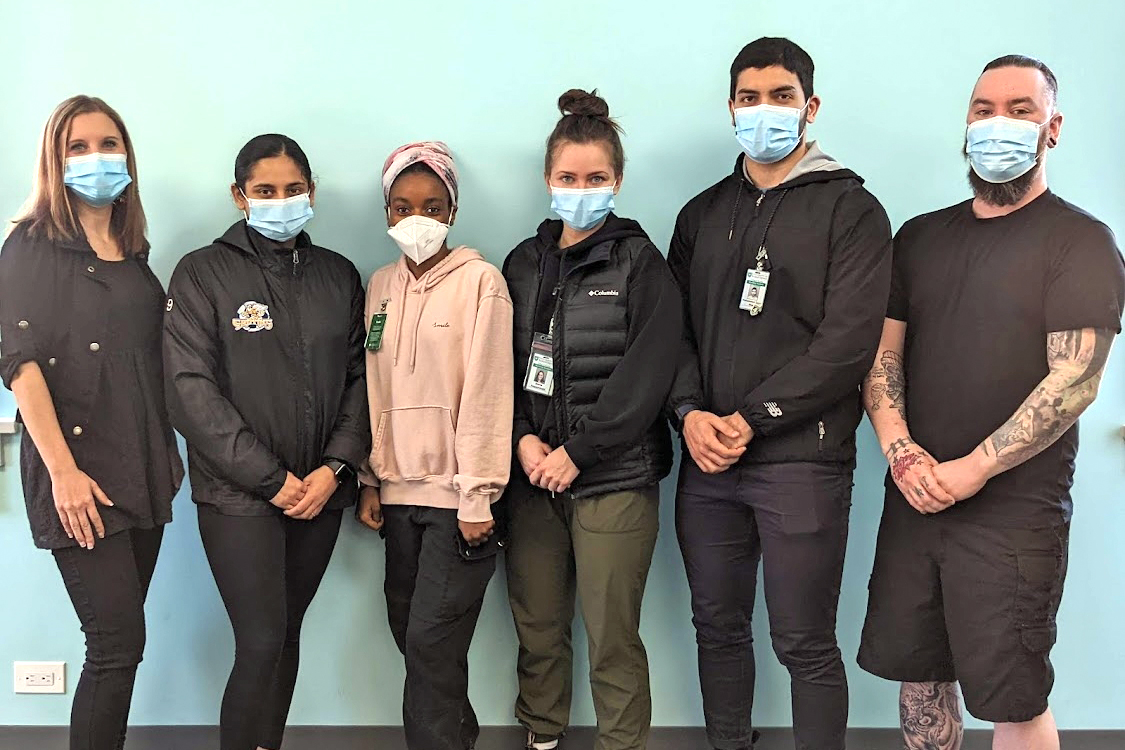
Coming Together to Care for the Most Vulnerable
College of Nursing faculty and students work together with the Friendship Centre in Regina to purchase life-saving equipment.
Saskatchewan has experienced a concerning increase in the number of drug overdoses since the beginning of 2022. The Newo-Yotina Friendship Centre in Regina operates an overdose prevention site (OPS), which is Regina’s only place for supervised drug use.
Fourth year University of Saskatchewan (USask) College of Nursing students are finishing up an exciting community nursing rotation at the Friendship Centre and have witnessed first-hand how the OPS supports the health and wellbeing of some of the city’s most vulnerable community members.
“The overdose prevention site sees hundreds of people a month who are using our harm reduction services and countless overdose deaths are being prevented,” said Émile Gariépy, primary care paramedic and harm reduction manager at the OPS. “People who use drugs are often isolated and stigmatized. The OPS is a place for them to be safe when consuming drugs, so they aren’t alone and the outcome isn’t fatal.”
With more people frequenting the site, it’s essential the on-site health care providers have access to important harm reduction equipment. Working alongside Gariépy, USask nursing students Sierra, Tao, and Daud and University of Regina human justice student Komal, identified the urgent need for an on-site LIFEPAK 15 monitor and defibrillator, a life-saving machine with capabilities for vital signs, cardiac monitoring, defibrillation, cardioversion, and pacing.
“The nursing students are doing amazing work - they are providing health education, connecting people with supports and resources, helping clients be safe and to feel valued and heard,” said Gariépy. “But what we really need is a LIFEPAK 15!”
The catch? The LIFEPAK 15 costs approximately $35,000. However, Stryker Canada was willing to provide the machine to the OPS at preferred provincial account pricing, as Stryker Canada is the manufacturer and distributor of the LIFEPAK 15 for the Saskatchewan Health Authority.
“We believe in harm reduction and are happy to partner with the Friendship Centre to provide this best-in-class life-saving equipment,” said Jeffrey Krul from Stryker Canada.
USask College of Nursing instructor Joleen Klassen and her students rallied together determined to find a way to purchase the much needed equipment. The students wrote a letter to request donations from the community and one email from Klassen to College of Nursing faculty and 24 hours later - the fundraising goal was reached! Faculty from across the province contributed to purchase the life-saving equipment.
College of Nursing assistant professor Dr. Anne Springer (PhD) was happy to support the important community initiative.
“In my days of community practice in the late 1990s, I worked with the local Native Friendship Centre in the Northern Interior of British Columbia in the development of a Safe House for Indigenous Youth and I had the opportunity to see first-hand what life is like for individuals suffering with substance use disorders,” said Dr. Springer.
“To hear what our students were doing during this particular community clinical was heartwarming to say the least, and to hear of our students’ recognition of how equally precious these vulnerable lives are was encouraging, as it is evident the students are understanding the value of community nursing,” adds Springer.
“The LIFEPAK 15 will enable the on-site paramedic to provide supplementary health assessments and education, but most importantly, it will bridge the time gap between calling emergency medical services (EMS) and their arrival,” said USask College of Nursing student Sierra. “Having the machine on-site will give the attending paramedic the opportunity to provide relevant information to EMS, which will allow EMS to quickly prepare the necessary interventions and in turn, save more lives.”
“We value our connection with the Friendship Centre and the clients it serves,” said Klassen. “Community nursing is about building relationships, partnerships, and trust. It’s about working with our communities to be as healthy as possible, given the immense challenges these clients face every day. Every life lost to an overdose is one life too many.”
For Gariépy, his work at the Friendship Centre hits close to home. He knows first-hand what it’s like to struggle with homelessness and drug addiction. “It’s made me who I am today and when I see the clients, I can relate to them. People helped me when I needed it most, and now I’m happy to give back in any way that I can. When the students told me they were able to raise the funds for the LIFEPAK 15, I couldn’t believe it. This new lifesaving equipment means the world to the Newo-Yotina Friendship Centre, and most importantly, the clients whose lives will be saved by having this equipment on-site.”

